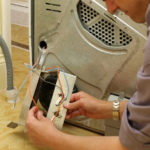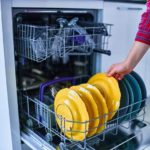Thinking about getting a dishwasher but not sure if it’s really worth buying one for your home?
You’re not alone on this one! Lots of people feel the same way and are debating about whether or not they need a dishwasher.
Sorry to disappoint you, but there’s no simple answer to this question. Deciding if a dishwasher is for you or not, rests on several factors, and you need to consider each one before you commit to purchasing the appliance.
These factors include:
- The costs of buying and running the appliance.
- Personal preference.
- How often you would use it.
- Practicalities
Let’s take a look at these points in more detail.

Do You Really Need a Dishwasher?
Before you dash off to buy a dishwasher, you need to ask yourself a few questions, namely:
- Can you afford to buy a dishwasher right now?
- Do you need a dishwasher at home?
- Are you going to make good use of a dishwasher and use it to its full capacity?
- Have you got enough room to house a dishwasher?
- Can you afford the costs involved with getting a dishwasher?
Answering the above won’t be as straightforward as you might think. But if you are able to answer the majority of the questions in a positive way, you should think about getting a dishwasher.
On the other hand, if your answers are mostly negative, perhaps you should think of alternative ways of cleaning your dishes for now, and you can reassess this idea in a few months.
Check out the benefits and drawbacks of getting a dishwasher below, so you can get a clearer picture of what it would be like to purchase such an appliance.
Benefits of Having a Dishwasher
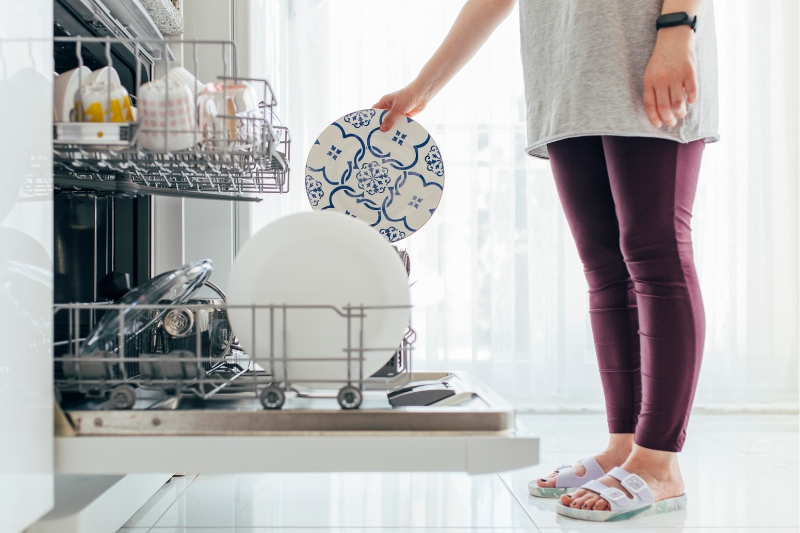
Saves you time and energy
Washing dishes by hand can be a tedious task that can take a long time to complete, especially if you need to clean greasy pots and pans.
A dishwasher, on the other hand, just needs to be loaded up with dirty crockery, a tablet needs to be added to the appliance, a cleaning cycle needs to be chosen, and then you can press ‘Go’.
All the hard work is done for you, and you don’t have to worry about washing and drying your dishes! Which means you can get back to spending time with your family and friends.
Usually offers a better clean
A dishwasher is able to use much hotter water to clean dirty dishes, and the spray arm inside the appliance is very powerful, so it can rip through grime and remove the bacteria from your plates!
Unfortunately, no matter how much elbow grease you put into hand washing your cookware, some dirt just won’t budge!
Plus, people tend to use the same rag/sponge to clean multiple piles of dishes over a few days, which isn’t very hygienic.
The cloth in question is probably riddled with germs, and you just spread these microorganisms around as you clean your cookware! Yuck!
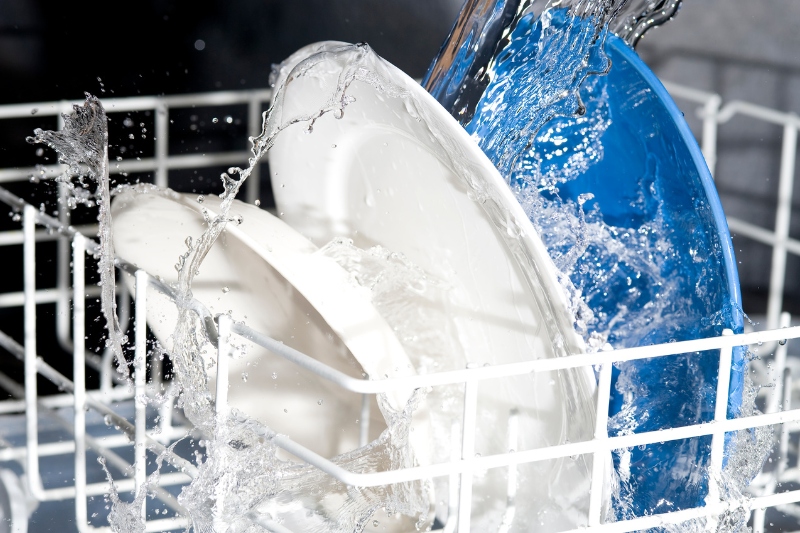
A dishwasher uses less water
Various tests over the years have found that dishwashers tend to use far less water than if you were to clean dishes by hand.
Recent research demonstrates that when people clean a simple place setting for two people, they will use, on average, nine litres of water to clean these dishes by hand.
Even the least-efficient dishwashers would use about half the amount of water to clean the same pile of crockery, which is more cost-effective.
It can be safer to clean dishes in a dishwasher
When you clean crockery in a sink, the plates, glasses, and utensils knock against each other and occasionally break.
Although this isn’t a major problem, sometimes when you submerge your hands into the water to clean the dishes, you don’t always realise what’s happened, and you end up cutting yourself.
Plus, you might’ve lost a glass or plate in the process!
Similarly, if your hands are full of suds, a plate or cup is more likely to slip out of your hand as you transport it to the draining rack.
In contrast, when you load a dishwasher, your hands and the cookware are generally dry, so the utensils, plates and pans don’t slip around as much.
You can then place each item onto/into its designated space on the racks with ease, and start a cycle.
When the appliance finishes, you can leave your items on the rack or remove them.
Given the fact that you loaded the plates and cutlery into the designated spots at the start, they can be removed from the racks without much trouble.
Plus, the cookware won’t have been rattling around in the machine, so its lifespan will be protected!
There’s generally no need for you to go fumbling around in a dishwasher as everything is well-organised, so you and your cookware should be a lot safer!
Drawbacks of Having a Dishwasher
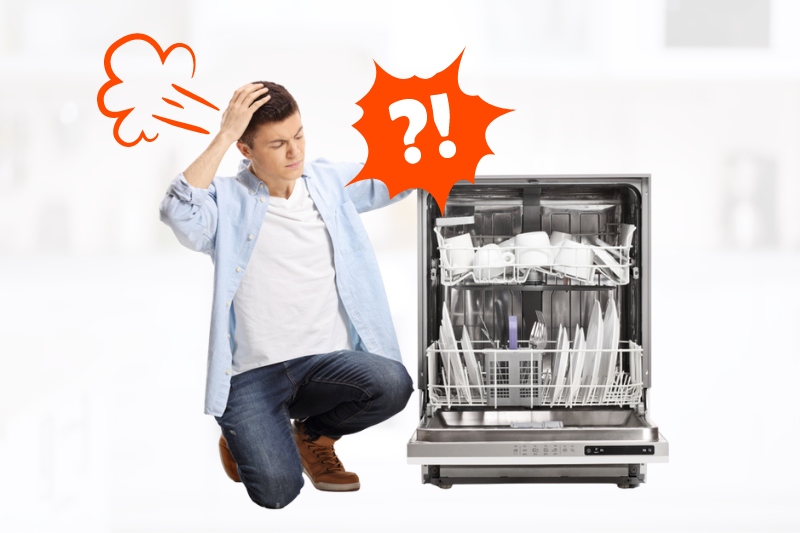
Below you’ll find a number of drawbacks associated with getting a dishwasher.
The cost of buying and servicing a dishwasher
One of the biggest drawbacks of getting a dishwasher is that there’s an initial cost that you have to pay for the appliance.
This cost varies depending on what make and model you buy and what time of year you pick up the machine.
In addition to this, you also have to think about any additional costs you might have to cover, including getting the appliance delivered, calling a plumber out to fit any new inlets/outlets, and if you need to upgrade any existing plumbing/electrics.
Not making the most of your dishwasher
Using a dishwasher generally works out cheaper than washing dishes by hand. However, to make the most of your dishwasher, you need to fill the appliance up with dirty dishes, and then run a cleaning cycle.
If you only run half-loads, you’re not likely to be getting value for money from the machine, and it could work out more expensive to run.
If you’re a single person, it might not be worth getting a dishwasher as you might not use many dishes during a day to fill your dishwasher up properly, and just run small loads instead.
In this case, it might be more cost-effective if you just washed your handful of dishes by hand instead.
Also, running your dishwasher on an ‘eco-setting’ should also help to reduce running costs and could save around 20% more energy. But if you don’t select this option, your machine will run a normal cleaning cycle which could cost more.
See our article on dishwasher running costs to learn how much owning a dishwasher could cost you.

Maintaining and repairing the machine can be a pain
Dishwashers, like most appliances, need to be cleaned, unclogged and maintained on a regular basis. And although it’s not too hard to keep a dishwasher in tip-top form, it can be time-consuming.
Plus, if you forget to clean the dishwasher for a few months, you’ll have a build-up of gunk to clear away, which won’t be very pleasant for you, and it’ll be incredibly taxing work.
Not maintaining said appliance also puts needless strain on it. This, in turn, means that parts are more likely to stop working and will need to be repaired.
If something breaks in your dishwasher, you have to get it fixed, otherwise, you won’t be able to use the machine effectively.
There are a few different parts that can break down in a dishwasher, and they can sometimes be costly to repair, especially if you need an engineer to come out and help you.
The noise of a dishwasher can be annoying
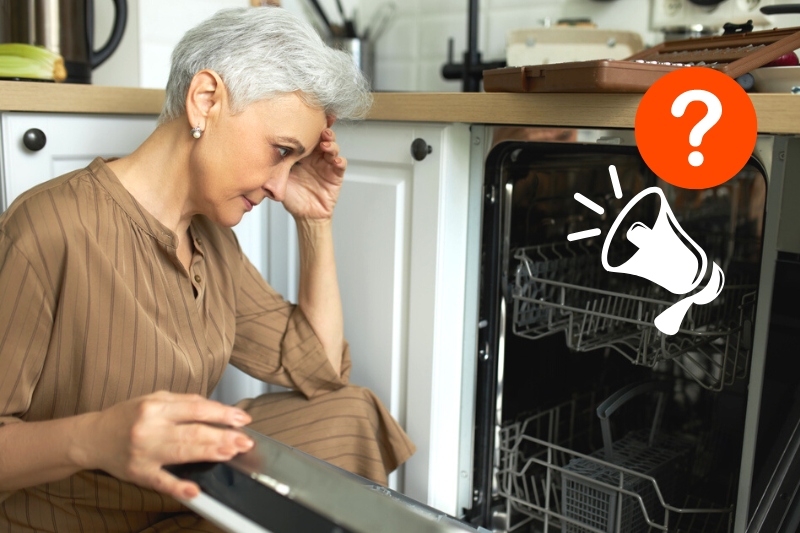
Most modern dishwashers aren’t too loud, unless something is there is an issue causing excessive noise. And before you buy a dishwasher, you can check the tag on the machine to see how noisy it will be in decibels. There’s also a noise rating graded from A to D, with A being the quietest.
However, if you’ve accidentally picked a loud machine, you might find that the sound is very annoying and rather intrusive! This is particularly problematic if your home is open plan.
Trying to wine and dine guests with the humming of a dishwasher in the background can be irritating!
You need enough room
A dishwasher is usually placed in a kitchen, so it takes up a cupboard’s space. This isn’t normally much of a problem if you’re able to sacrifice a cabinet.
However, if you don’t have a big kitchen and are already short on room, is losing even more space to accommodate a dishwasher a good idea? Probably not.
You can’t really plonk a dishwasher anywhere, either. A dishwasher needs to be near water inlets and outlets, as well as a power source.
If you want a dishwasher but you’re short on space, a tabletop dishwasher could be a good option.
You can’t clean all cookware in a dishwasher
Not all crockery can go in a dishwasher. So before diving in and buying said appliance, have a look at the bottom of your dishes to see if they can be cleaned in a dishwasher.
If most of your crockery isn’t dishwasher-friendly, you’ll either need to go out and purchase new dishes, or it might be better to skip getting a dishwasher for the time being.
Dishes like the following shouldn’t go in a dishwasher, crystal, wooden items (spoons and chopping boards), vintage items, non-stick cookware, and insulated coffee cups.

Conclusion
In summary, the benefits of getting a dishwasher are that it could save you time while cleaning and sanitising your dishes to a higher standard and saving you money on your water bills.
However, there are downsides to buying a dishwasher. These include the cost of buying, setting up and maintaining the appliance.
Also, the dishwasher might be noisy, you’ll have to sacrifice some cupboard space to house the machine, and if you don’t make the most of your appliance, it could work out costly to run.
If you’re looking for a convenient cleaning device, are happy to absorb all the costs involved with getting the appliance, and think it would be a practical solution for your home, go ahead and buy a dishwasher!
However, don’t buy a dishwasher just for the sake of it! Some people find washing by hand suits their lifestyle better, even though using a dishwasher is more energy and water efficient.
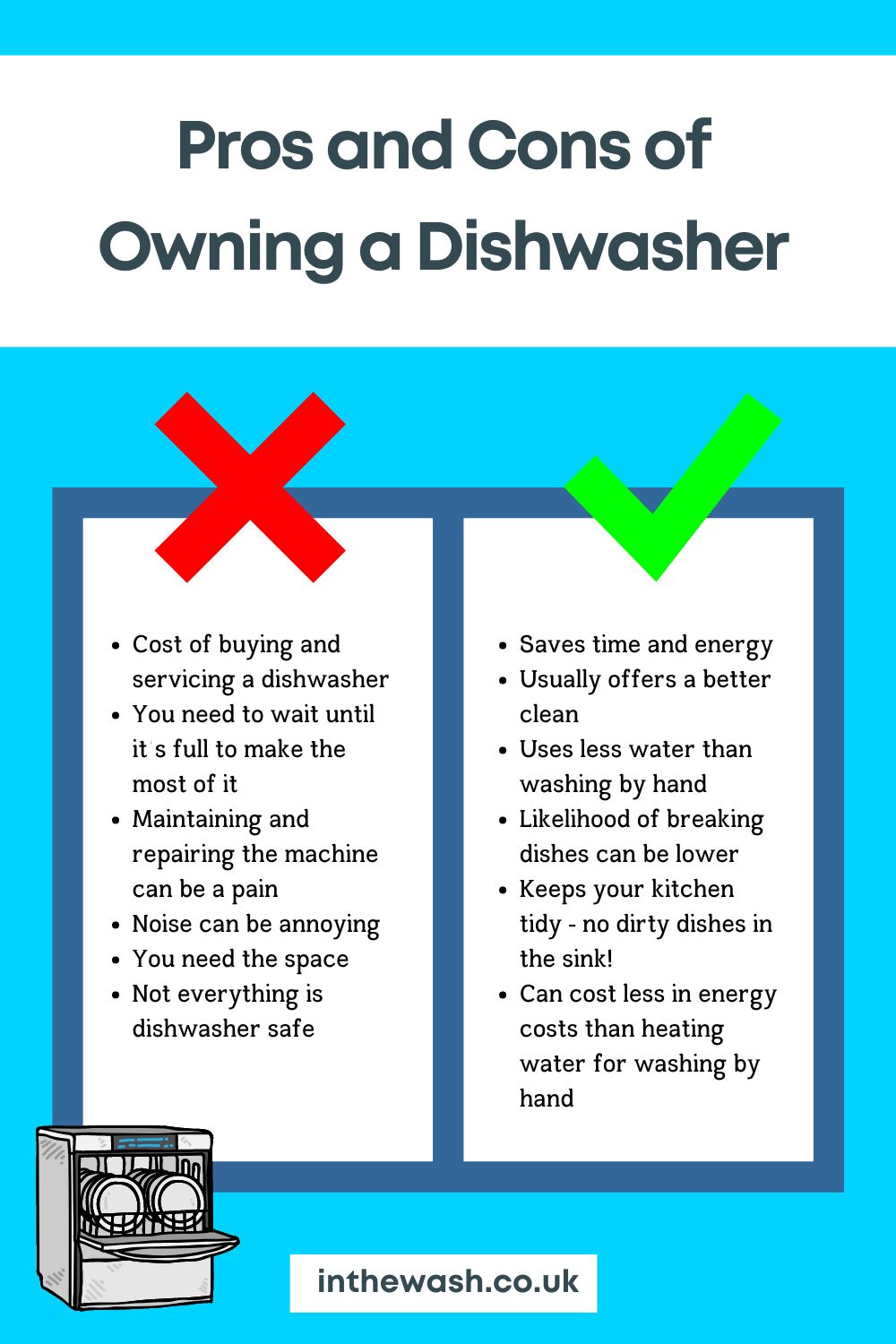

Bethan has a passion for exploring, reading, cooking and gardening! When she’s not creating culinary delights for her family, she’s concocting potions to keep her house clean!




